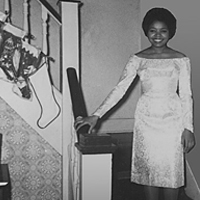The Christmas following my sixteenth birthday, I bought the prettiest dress I have ever owned— off-the shoulder, silver lamé, tapered sleeves—it was the bomb. Thanks to my sister, Lois, here it is. She saved this photo of me coming down the stairs in our home in Ohio wearing my sparkling find.
Stronger than my memory of how I liked this dress is remembering an important life lesson from my mother.
It took me weeks to finish paying for that dress. This was back in the day when every store had layaway. One day, I calculated the balance and realized I came up a little short. My strategy was pretty much limited to convincing my aunts and uncles to give me Christmas money instead of gifts.
That was also the year when I met the wonderful young man who became my husband and best friend for life. Our friendship was the object of my lesson. We had been dating casually for about three months. In fact, in this picture, he was taking me to a Christmas party.
Silver lamé? At a teen house party, you ask? Was I a little overdressed? Maybe, but it was an early version of me being me. Besides, that’s not the object of my story.
Suddenly, my problem was solved. When I mentioned my intended purchase to my new friend, he offered the perfect solution. He would give me the money as a Christmas gift. After all, Floyd was one of a few friends with a job. He was two years older and had just graduated from high school; he had both a job and a cool car.
The mistake I made was sharing this marvelous plan with Mom. Such a perfect idea. It never occurred to me that my mother would object. “No, I don’t think so,” she said. “That is not appropriate at all. I want you to know that a Lady never accepts money from someone who is not her husband.”
You had to have known Linnie Cordelia to visualize her stopping whatever she was doing at the time to stare at me—just pretend you can hear the emphasis she put on her words. Her answer was firm; she was serious. This was non-negotiable. I was a junior in high school, so, obviously, I was not considering marriage. My mother’s answer, then, boiled down to one word: No!
I grew to appreciate my mother for not missing this teaching moment.
The reason I begged my sister to dig out this picture was to remember that simple lesson. It all came back because of news stories that have appeared since this summer about bright young college women, called “sugar babies,” who get tuition and bills paid by wealthy men, “sugar daddies.” The stories appeared on the television networks and in a riveting article by Amanda M. Fairbanks in The Huffington Post. A few young women spoke on camera with their identities protected. They told stories that broke my heart, admitting how sad these arrangements have made them.
These cash-strapped young women obviously didn’t have a mother like mine to share important, pivotal lessons of character and Christian morals. No one warned them of the potential for ultimate danger (violence, manipulation), the risks (physical, emotional and mental) or the high price (depression, low self-esteem) that they may eventually pay for finding a convenient financial solution in the wallet of an internet stranger. In many cases, the stranger is probably someone else’s husband—but that’s another blog post about a much deeper moral issue. They do not understand the danger of compromising standards that make them whole, balanced, strong and self-confident.
The missing lessons are what makes me sad. It’s difficult for our children to know what the important standards are unless someone teaches them. The mantra of too many young people today—and, sadly, for more than a few of their mothers—matches the lyrics of a song, “get all you can…and can all you get.”
One of my most astonishing moments as a pastor’s wife occurred when a woman spoke these words to me about her granddaughter: “She has a boyfriend, and he is fine!” It was as if that occurrence was the first and only thing that qualified her granddaughter as a legitimate person who was fulfilling her real purpose in life. I resisted the urge to scream and fall out backwards.
Those of us who influence young people need to take advantage of every opportunity to teach them holiness. We need to interject those small, gentle, timeless lessons of faith and values.

Thank you for another great post. Where else could anyone get that kind of information in such a perfect way of writing?
Wonderful picture. I miss you, Merry Christmas and hope to see you soon.